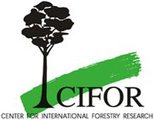A paper published by the Center for International Forestry Research (CIFOR) on the 'Futures of Tropical Production Forests' concludes that there is a critical need for interdisciplinary research at appropriate scales to inform decisions about forest fates.
 November 2015: A paper published by the Center for International Forestry Research (CIFOR), titled ‘Futures of Tropical Production Forests,’ concludes that there is a critical need for interdisciplinary research at appropriate scales to inform decisions about forests.
November 2015: A paper published by the Center for International Forestry Research (CIFOR), titled ‘Futures of Tropical Production Forests,’ concludes that there is a critical need for interdisciplinary research at appropriate scales to inform decisions about forests.
Authored by Francis Putz and Claudia Romero, the paper examines silvicultural options for tropical forests, summarized in three general trajectories that describe increasing silvicultural intensities and consequent increasing forest domestication. They include: continued forest degradation by poor logging; adoption of reduced-impact logging; and silvicultural intensification in natural forests. The silvicultural approaches discussed include: changes in timber harvesting regimes; treatments to increase growth of future crop trees; treatments to promote natural regeneration; and artificial regeneration.
The authors argue that the environmental, social and economic benefits of natural forest management will be maximized where these and other silvicultural treatments are applied in appropriate landscapes, as determined through functional zoning based on land-use capabilities and other factors. Research on tropical silviculture, however, is currently insufficient to provide clear insights about the many trade-offs associated with each possible intervention.
The authors note that the diversity of forest states (e.g. secondary, degraded, fragmented, invaded and managed) and the fact that none of these states is permanent, gives reason for hope. Even deforestation need not be permanent. It is argued that with so many forest values recognized to different degrees by different people, the future of tropical production forests is likely to represent an ever-changing mosaic of a gradient of forested-type landscapes. To assure that this future is as environmentally, socioeconomically and politically sound as possible, interdisciplinary research at appropriate scales is needed with the best designs possible to capture the impacts of relevant silvicultural treatments on the full range of response variables.
CIFOR is a member of the CGIAR Consortium. [Publication: CIFOR Occasional Paper no. 143: Futures of Tropical Production Forests]